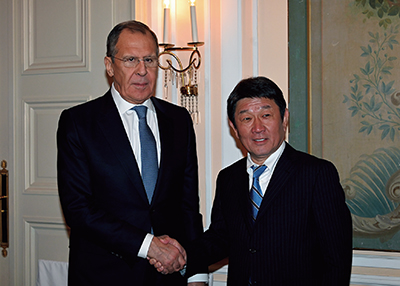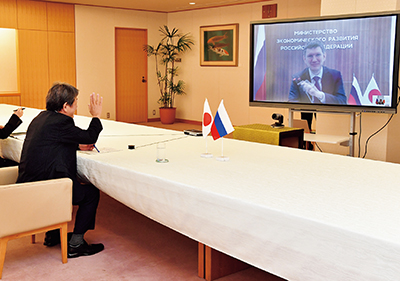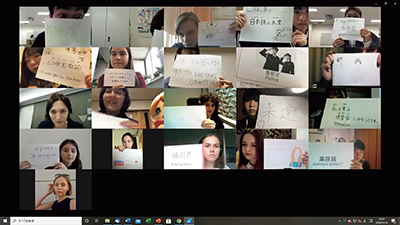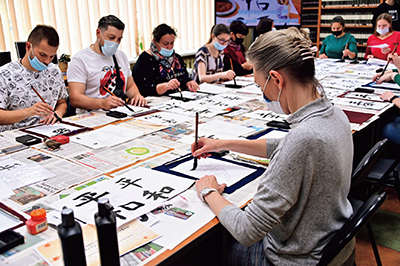Diplomatic Bluebook 2021
Chapter 2
Japan's Foreign Policy by Region
Section 6 Russia, Central Asia and Caucasus
1 Russia
(1) Situation in Russia
A Internal Situation in Russia
On January 15, President Vladimir Putin appealed in his annual Address to the Federal Assembly for the need to amend the constitution in order to accomplish purposes such as a reform of state institutions. Prime Minister Dmitry Medvedev announced the intention of the Cabinet to resign en masse in order to realize such a constitutional amendment. On the following day President Putin appointed Mikhail Mishustin as the new prime minister, and the Mishustin Cabinet was inaugurated.
The work to amend the constitution began following his appointment, and federal and local parliaments approved an amendment bill in March. However, voting in the referendum on the bill scheduled for April was forced to be postponed due to the spread of the novel coronavirus disease (COVID-19). In addition, the military parade for the 75th anniversary of the victory of the Great Patriotic War (against Germany) scheduled for May 9 was also postponed but took place on June 24 with attending foreign leaders limited to some former Soviet Union countries. The postponed referendum on the constitutional amendment took place on July 1, and the revised constitution came into effect on July 4.
Regarding COVID-19, a new COVID-19 vaccine developed in Russian laboratories was approved in August ahead of other countries without waiting for the end of Phase 3 clinical trials. In December, nationwide vaccinations began.
B Russian Economy
Russia was forced to make hard decisions on balancing COVID-19 measures and the economy amid a sharp decline in crude oil prices for a period of time, upon which the Russian economy is highly dependent, due to a failure to reach joint cooperative production cuts at the OPEC Plus meeting in early March and the COVID-19 pandemic. The effects of the pandemic began to appear in economic statistics after April, and in 2020, economic growth declined for the first time since 2015 (Russian Federal State Statistic Service: -3.1%, preliminary figures). Unstable factors for the economy still remain, such as the continued sanctions on Russia by European countries and the U.S.
C Russian Diplomacy
Sanctions on Russia by European countries and the U.S. continued, although there was some practical cooperation between Russia and these countries, such as measures to counter COVID-19. Moreover, the G7 issued a foreign ministers' statement in September on the poisoning of Russian opposition figure, Alexey Navalny, which was followed by heated exchanges with European countries and the U.S. over the case, and signs of improving relations were yet to be seen.
Although Russia held no annual summit meeting with China due to the spread of COVID-19, both countries continued to maintain close ties with each other, such as via active telephone calls between the leaders and foreign ministers. In addition, in December, there were also movements by Russia appealing for closer military cooperation between Russia and China, picking up from July 2019, such as the second joint flight by Russian and Chinese bombers from the Sea of Japan to the East China Sea.
Regarding the former Soviet Union countries, in the turmoil surrounding the Belarusian presidential election, Russia supported the Lukashenko administration and frequent communication was conducted between the leaders. In addition, in the Nagorno-Karabakh issue, Russia actively mediated the armed confrontation between Azerbaijan and Armenia that occurred from the end of September and reached a ceasefire agreement among the leaders of the three countries that included stationing of the Russian peacekeeping contingent.
Russia also chaired the Shanghai Cooperation Organization (SCO) and BRICS (Brazil, Russia, India, China and South Africa), whose meetings were held online.
(2) Japan-Russia Relations
A Japan-Russia Relations in the Indo-Pacific Region
Amidst the significant changes in the strategic environment of the Indo-Pacific, the building of stable relations with Russia contributes not only to Japan's national interests but is also extremely important for regional stability and development. There is no change to Japan's intention to place importance on its relations with Russia. On the other hand, the Northern Territories issue, which is the greatest concern between Japan and Russia, is yet to be resolved even after more than 75 years have passed since the end of World War II.
Given this situation, the Government of Japan will further deepen cooperation considering the potential of bilateral relations in order to build a suitable relationship as an important partner in the region. Japan will also develop the overall Japan-Russia relationship across a broad range of fields, including politics, economy, as well as people-to-people exchanges, including the issue of concluding a peace treaty, and work to resolve the Northern Territories issue.
B The Northern Territories and Negotiations on Peace Treaty
The greatest concern between Japan and Russia is the Northern Territories issue. The Northern Territories are islands over which Japan has sovereignty. Holding frequent dialogues between the two leaders and Foreign Ministers, the Government of Japan has been energetically continuing negotiations with Russia to conclude a peace treaty through the resolution of the issue of the attribution of the Four Northern Islands.1
In 2020, in-person discussions became difficult due to the spread of COVID-19 following the Japan-Russia Foreign Ministers' Meeting which took place in Munich in February. Under the circumstances that in-person discussion became difficult due to the spread of COVID-19 after that, three Summit Telephone Calls and two Japan-Russia Foreign Ministers' Telephone Calls were held between the two countries. At the Japan-Russia Foreign Ministers' Meeting in February, Foreign Minister Motegi conveyed his thoughts more concretely regarding ways for advancing the negotiations following the December 2019 Foreign Ministers' Meeting in which Japan and Russia were able to commence full-fledged consultations on peace treaty negotiations. During the Japan-Russia Summit Telephone Call and the Foreign Ministers' Telephone Call in May, Japan and Russia shared the view to proceed steadily with consultations and cooperation between the two countries, including on the negotiations on a peace treaty.
 Japan-Russia Foreign Ministers' Meeting
Japan-Russia Foreign Ministers' Meeting(February 15, Munich, Germany)
Following the inauguration of the Suga administration, at the Japan-Russia Summit Telephone Call held in September, President Putin said that he intended to continue discussing all bilateral issues, including the issue of concluding a peace treaty. Prime Minister Suga stated that he attached great importance to Japan-Russia relations and would like to develop the overall relationship between Japan and Russia, including the issue of concluding a peace treaty. In addition, the two leaders reconfirmed that Former Prime Minister Abe and President Putin had agreed to accelerate negotiations on a peace treaty on the basis of the Japan-Soviet Joint Declaration of 1956 at the summit meeting in Singapore in November 2018. During the Japan-Russia Foreign Ministers' Telephone Call in October, the two Foreign Ministers shared the view to continue frank discussions at the foreign minister level as well, in order to advance consultations and cooperation including negotiations on a peace treaty.
Regarding the joint economic activities on the Four Northern Islands on which the leaders agreed2 to commence discussions during President Putin's visit to Japan at the end of 2016, Japan and Russia have continued discussions at vice-ministerial level talks and director-general-level working group meetings, in addition to talks at the summit and foreign ministerial levels in order to materialize the five candidate projects3 designated at the Japan-Russia Summit Meeting in September 2017.
The Government of Japan is actively working on projects contributing to the improvement of the atmosphere for the resolution of the Northern Territories issue, such as the four-island exchange program, free visits and visits to graves. In 2019, as part of humanitarian measures for the former island residents of the Northern Territories, a temporary additional entry/exit point was established on the occasion of a grave visit by ship, and furthermore, a grave visit by airplane was realized for a third year in a row. During the grave visits, the former island residents were able to visit places they had been unable to go to in recent years. Japan and Russia shared the view to continue to simplify the relevant procedures. The circumstances surrounding the COVID-19 pandemic made it difficult to implement programs in 2020, but the Government of Japan intends to continue consultations between the Japanese and Russian governments and between the implementing organizations of our side and on the four islands in order to implement programs as soon as possible.
In addition, the Government of Japan is approaching and coordinating with the Russian side in order to ensure safe operations of Japanese fishing vessels around the Four Northern Islands and to continue the fishing of salmon and trout using alternative fishing methods to driftnet fishing prohibited by Russia. At the same time, Japan is taking appropriate actions against Russia's moves to build up military forces in the Four Northern Islands, on the grounds that such moves are contradictory to the Government of Japan's position regarding the territorial issue.
Under the strong leadership of the Japanese and Russian leaders, the Government of Japan will continue to persistently negotiate with Russia to conclude a peace treaty by resolving the issue of the attribution of the Four Northern Islands.
- 1 Refer to the Ministry of Foreign Affairs website for the position of the Government of Japan on the Northern Territories issue:https://www.mofa.go.jp/region/europe/russia/territory/index.html

- 2 As a result of the Japan-Russia Summit Meeting in December 2016, the two leaders expressed their sincere determination to resolve the peace treaty issue, agreed to commence discussions on joint economic activities on the Four Northern Islands, and agreed to improve procedures for grave visits by former island residents.
- 3 (1) Propagation and aquaculture of marine products, (2) Greenhouse cultivation, (3) Development of tours compatible with the islands' features, (4) Wind power generation, (5) Waste management
C Japan-Russia Economic Relations
Trade volume between Japan and Russia in 2020 was affected by lower demand due to COVID-19, and the trade volume from January to December decreased by 24.3% year on year. In particular, the transaction volume of mineral fuels (crude oil, natural gas, coal, etc.), which are major import items, decreased by 37.7% year on year (the total trade volume in the January-December 2020 statistics is approximately 1.7738 trillion yen (Source: Trade Statistics of Japan, Ministry of Finance)).
The volume of direct investment from Japan to Russia increased from 168.8 billion yen (2018) to 239.5 billion yen (2019) (Source: Balance of Payments Statistics, Bank of Japan).
With regard to the Eight-point Cooperation Plan for Innovative Reform in the Fields of Industry and Economy and a Favorable Living Environment of Russia proposed by Prime Minister Abe in May 2016, despite various restrictions on bilateral business cooperation due to the COVID-19 pandemic, various private-sector projects have been established in the development of trade and economic cooperation between the two countries, such as the joint development of virus rapid test kits by Japanese and Russian companies.
In December, Japan and Russia continued dialogues online through the following frameworks: the 12th meeting of the Trade and Investment Subcommittee of the Japan-Russia Intergovernmental Committee on Trade and Economic Issues and the 9th Meeting of the Subcommittee on Region-to-Region Cooperation, which are vice-ministerial level talks, and the Meeting of the Co-chairs of the Japan-Russia Intergovernmental Committee on Trade and Economic Issues, between Foreign Minister Motegi and Minister of Economic Development Maksim Reshetnikov. At the meeting, the two ministers shared the view to continue to promote bilateral trade and economic cooperation under the Eight-point Cooperation Plan.
 Meeting between the Co-chairs of the Japan-Russia Intergovernmental Committee on Trade and Economic Issues (December 21)
Meeting between the Co-chairs of the Japan-Russia Intergovernmental Committee on Trade and Economic Issues (December 21)Furthermore, the Japan Centers operating in six cities in Russia carry out business matching between companies from both countries and hold management courses. To date, a total of some 94,000 Russian people have taken the courses and about 6,000 of them have visited Japan for training.
D Cooperation between Japan and Russia in Various Fields
(A) Security, Defense Exchanges and Maritime Security
The leaders of Japan and Russia have shared the recognition that they will further advance cooperation in dealing with “non-traditional threats” such as drugs. In February, Japan, Russia and the United Nations Office on Drugs and Crime (UNODC) held a training course (“Domodedovo Project”) for counter-narcotics officers of Afghanistan and Central Asian countries, as a part of the project conducted since 2012 (“Domodedovo Project”). Similarly, regarding a project for a construction of the Narcotics Canine (K9) Center in Kabul which Japan, Russia and UNODC have advanced, they held a ground-breaking ceremony to mark the start of construction of the Center in September.
Japan and Russia have conducted the Japan-Russia Foreign and Defense Ministerial Consultation (“2+2” Ministerial Meeting), various dialogues between defense authorities, an annual meeting based on the Japan-Russia Incidents at Sea Agreement, and the Japan-Russia Search and Rescue Exercise (SAREX) from the perspective of building trust between Japan and Russia through defense exchanges. In January, the Japan-Russia Security Consultations took place, during which both parties held candid discussions on their security policies and various issues related to international and regional security. Also in January, Japan conducted the second joint counter-piracy exercise with Russian Navy vessels in the Gulf of Aden. In addition, though in-person discussion became difficult due to the spread of COVID-19, communication at the working level continued through the methods such as online formats.
(B) Cultural and People-to-people Exchanges
It became difficult to hold many in-person events due to the spread of COVID-19, but with regard to the Japan-Russia Youth Exchange Program, exchanges took place in a variety of formats, including online, in a broad range of fields.
The “Japan-Russia Year of Regional and Sister-City Exchanges (Japan-Russia Regional Exchange Year),” being held from 2020 to 2021, is also being advanced online. More than 140 Japan-Russia Regional Exchange Year programs have been accredited in Japan, with over 386,000 participants that included the online introduction to Japanese culture program “J-FEST” in which approximately 216,000 people participated.
 Exchanges between High School Students through Online Japanese Language Courses, one of the Japan-Russia Youth Exchange Programs (November; Photo: Japan-Russia Youth Exchange Center)
Exchanges between High School Students through Online Japanese Language Courses, one of the Japan-Russia Youth Exchange Programs (November; Photo: Japan-Russia Youth Exchange Center) “Introduction to Japanese Culture (Sakhalin Calligraphy Class),” Japan-Russia Grassroots Exchange Program (October, Yuzhno-Sakhalinsk, Russia)
“Introduction to Japanese Culture (Sakhalin Calligraphy Class),” Japan-Russia Grassroots Exchange Program (October, Yuzhno-Sakhalinsk, Russia)